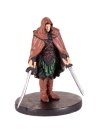Robin Hood
This post is spawned from a debate about alignments that I was having with a friend of mine. Specifically, I was trying to differentiate between how a Lawful Good person CAN act, and how paladins usually act. She was under the impression that all LG characters had sticks up their butts. This is not the case, but it is how paladins are played most of the time which reinforces the stereotype.
Therefore, I needed a solid defensible example of a LG character with a fun side. Then it came to me, Robin Hood was Lawful Good! Don't believe me? Let's investigate:
Therefore, I needed a solid defensible example of a LG character with a fun side. Then it came to me, Robin Hood was Lawful Good! Don't believe me? Let's investigate:
- Robin Hood robbed from the rich and gave to the poor. Even though stealing was illegal, it was a good act since he was helping to ease suffering and overthrow a tyrant (Note: LG people are often extremely opposed to tyranny)
- Robin Hood was devoted to King Richard. Even though he was an "outlaw" during Prince John's rule, he still gave his allegiance to the one he considered the rightful ruler.
- Robin Hood planned his actions. With almost the tenacity of a general at war, he would always enter a situation with a plan in mind and not a kick-in-the-door mentality (no matter what the movies say).
- He was a leader. He had a band of loyal followers with a few being his closest friends. It was a little more informal, but it resembled an army with the general and his lieutenants and their soldiers.
- Robin Hood was a noble and, for a time, part of the military. This likely influenced some of his methods in forming the Merry Men and their subsequent raids on Prince John's forces.
Tags:
Labels: alignment, D and D, d20, Dungeons and Dragons











2 Comments:
Ok, I'm willing to concede about Robin Hood, I think. What I'm getting out of this post is that Lawful has nothing to do with the laws that are set down by some ruler; Lawful means methodical? I mean "for the greater good" is entirely subjective isn't it, depending on one's perception of what exactly the greater good is. Mojo Jojo's greater good is blowing up Townsville, and he's definitely not good (Although his name is fun to say.)
Ok, great Swamii, using your examples of how Robin Hood was LG, how would they change if good ol' Rob was CG?
Ok, first the relative good/evil debate doesn't apply to D&D (or at least not to the RAW). D&D uses a very objective view of good and evil, and what makes up good and evil is spelled out in some book or another. In this case, giving money to the poor and overthrowing a tyrant would be a good thing. As for if Robin Hood was CG, let's assume he still wants to overthrow the tyrant, he would be working for a slightly different goal (not necessarily reinstating the old monarch, but rather just freeing the people) and his group would be looser (and might be smaller). Then his merry men would probably look more like an adventuring party, free to come and go as they please, and all equals. If he was NG, it would probably be somewhere in between, maybe like an adventuring group but with a designated leader.
Post a Comment
<< Home